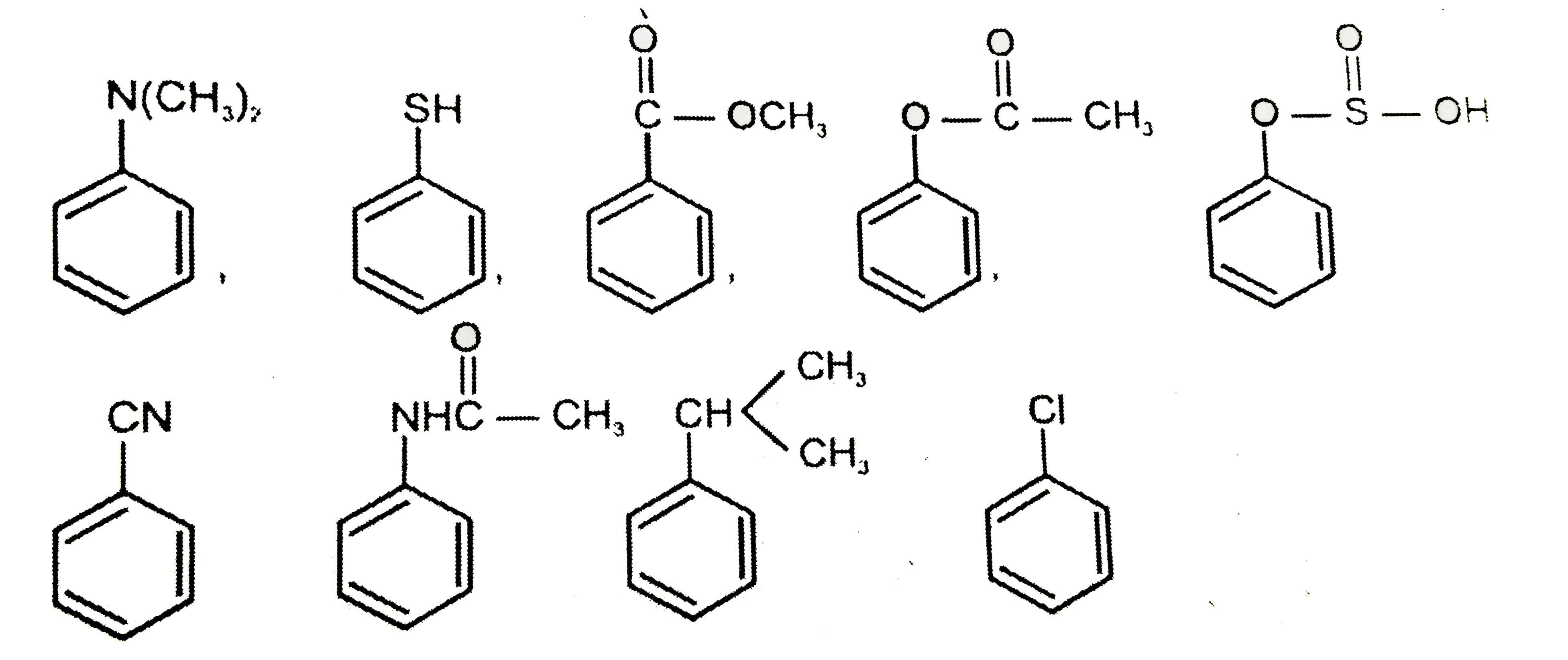Benzene easily shows
ring fission reactions since it is unstable
addition reactions since it is unsaturated
electrophilic substitution reactions due to stable ring and high π electron density
nucleophilic substitution reactions due to stable ring and minimum electron density.
The correct Answer is:C
To solve the question "Benzene easily shows," we need to analyze the options provided and determine which reactions benzene can undergo based on its structure and properties.
1. Understanding Benzene Structure:
- Benzene (C₆H₆) is a cyclic hydrocarbon with a ring of six carbon atoms, each bonded to one hydrogen atom.
- It has alternating double bonds, but due to resonance, the electrons are delocalized, making benzene very stable.
Hint: Remember that benzene is an aromatic compound with a unique structure that contributes to its stability.
2. Evaluating Ring Fission Reaction:
- A ring fission reaction involves breaking the benzene ring. However, benzene is very stable due to resonance and does not easily undergo ring fission.
- Therefore, this option is incorrect.
Hint: Consider the stability of benzene and its aromatic nature when thinking about reactions that involve breaking the ring.
3. Evaluating Addition Reactions:
- Benzene can theoretically undergo addition reactions due to its unsaturation (presence of double bonds). However, due to the delocalization of π electrons, it prefers to undergo substitution reactions instead.
- Thus, benzene does not easily show addition reactions like alkenes do.
Hint: Think about how the delocalized electrons in benzene affect its reactivity compared to alkenes.
4. Evaluating Electrophilic Substitution Reaction:
- Benzene readily undergoes electrophilic substitution reactions. In these reactions, an electrophile replaces one of the hydrogen atoms on the benzene ring.
- The high electron density in the π system makes it susceptible to attack by electrophiles, leading to the formation of a carbocation intermediate.
Hint: Focus on how the high electron density in benzene makes it reactive towards electrophiles.
5. Evaluating Nucleophilic Substitution Reaction:
- Benzene does not undergo nucleophilic substitution reactions because nucleophiles also have high electron density. The electron-rich nature of benzene makes it less likely to react with other electron-rich species.
- Therefore, this option is incorrect.
Hint: Recall that nucleophiles require a substrate that can accommodate their electron density, which benzene cannot due to its stability.
Conclusion:
Based on the analysis, the correct answer is that benzene easily shows electrophilic substitution reactions due to its stable aromatic structure and high π electron density.
Final Answer:
Benzene easily shows electrophilic substitution reactions.
- Benzene (C₆H₆) is a cyclic hydrocarbon with a ring of six carbon atoms, each bonded to one hydrogen atom.
- It has alternating double bonds, but due to resonance, the electrons are delocalized, making benzene very stable.
- A ring fission reaction involves breaking the benzene ring. However, benzene is very stable due to resonance and does not easily undergo ring fission.
- Therefore, this option is incorrect.
- Benzene can theoretically undergo addition reactions due to its unsaturation (presence of double bonds). However, due to the delocalization of π electrons, it prefers to undergo substitution reactions instead.
- Thus, benzene does not easily show addition reactions like alkenes do.
- Benzene readily undergoes electrophilic substitution reactions. In these reactions, an electrophile replaces one of the hydrogen atoms on the benzene ring.
- The high electron density in the π system makes it susceptible to attack by electrophiles, leading to the formation of a carbocation intermediate.
- Benzene does not undergo nucleophilic substitution reactions because nucleophiles also have high electron density. The electron-rich nature of benzene makes it less likely to react with other electron-rich species.
- Therefore, this option is incorrect.
Based on the analysis, the correct answer is that benzene easily shows electrophilic substitution reactions due to its stable aromatic structure and high π electron density.
Benzene easily shows electrophilic substitution reactions.
Topper's Solved these Questions
- BOOK - NCERT FINGERTPS ENGLISHCHAPTER - HYDROCARBONS EXERCISE - Higher Order Thinkin Skills7videos
HYDROCARBONS
- BOOK - NCERT FINGERTPS ENGLISHCHAPTER - HYDROCARBONS EXERCISE - Assertion & Reason15videos
HYDROCARBONS
- BOOK - NCERT FINGERTPS ENGLISHCHAPTER - EQUILIBRIUM EXERCISE - Assertion And Reason15videos
EQUILIBRIUM
- BOOK - NCERT FINGERTPS ENGLISHCHAPTER - HYDROGEN EXERCISE - Assertion And Reason15videos
HYDROGEN
Similar Questions
Knowledge Check
- Question 1 - Select One
The liquid pair benzene-toluene shows
APositive deviation from Raoult's lawBNegative deviation from Raoult's law.CPractically no deviation from Raoult's lawDIrregular deviation from Raoult's law.
Which of the following groups (attached with benzene ring ) show +M effect ?
 View Solution
View SolutionBenzene undergoes substituion reaction more easily than addition because
View SolutionBenzoic acid dissolved in benzene shows a molecular weight of:
View SolutionBorazine and benzene show striking similarities in their properties. This led to a labelling of borazine as 'inorganic benzene'. However, in contrast to benzene, borazine readily undergoes addition reactions. The appropriate reason for this difference is:
View SolutionLiquids cannot be easily compressed.
View Solution(A): HCl is not acidic in benzene.
(R): Benzene does not accept protonsView SolutionIn the chlorination of benzene the catalyst used is
View Solution

